|
As Congress debated Section 702 – the authority within the Foreign Intelligence Surveillance Act that allows U.S. intelligence agencies to surveil foreign threats located abroad – the FBI solemnly informed lawmakers that the use of Section 702 is essential to allowing the bureau to catch domestic terror plots. In fact, the FBI claimed Section 702 was used to derail a “potentially imminent terrorist attack” against critical U.S. infrastructure.
FBI Director Christopher Wray doubled down on this point in a speech on April 9, saying that “only by querying that U.S. person’s identifiers in our 702 collection did we find important intelligence on the seriousness and urgency of the threat.” FBI officials repeated that claim in an interview with Politico. These are apparent references to Brandon Clint Russell, a neo-Nazi founder of the self-styled “Atomwaffen Division” – charged with conspiring to attack electrical substations across Maryland. Yet, contrary to the agency’s repeated claims that their review of Section 702 data was essential to identifying him and the risk he posed, the FBI’s affidavit filed in the criminal case does not even mention Russell’s alleged communications with foreign targets of Section 702. And the absence of such information indicates that the FBI knew enough about him to seek a warrant without using its Section 702 database as a surveillance tool. “There they go again,” said Gene Schaerr, PPSA general counsel. “It is rank dishonesty to tell Congress one thing and the courts another.” Critics of Section 702 have long criticized the use of this authority as a way for the government to conduct “backdoor searches.” The FBI rejects that term but celebrates the use of Section 702 data to do precisely that, to use the global database as a predicate to develop domestic leads. These queries of Americans’ communications allow the government to develop investigative leads pulled out of global intercepts. It is a backdoor search because defendants often never learn about the origin of their case in court. In this case, however, there seemed to be abundant independent evidence to investigate Russell. “The filing suggests that even if the FBI performed a backdoor search, it was inconsequential,” Schaerr said. “The court filing indicates that the government had enough information to investigate – read the Wikipedia page of Brandon Russell – so why didn’t they just get a warrant as required by the Fourth Amendment?” And more important than the FBI’s failure to seek a warrant in this one case, this episode unfortunately illustrates the FBI’s willingness to lie to Congress – and by extension to the American people – to get the legislation they want. The FBI shouldn’t be surprised that no one in Congress takes their “sky is falling” cries seriously the next time around. PPSA's senior policy advisor, Bob Goodlatte, and general counsel, Gene Schaerr, explain in Just Security on why it’s imperative that intel agencies listen to bipartisan concerns re: surveillance reform. Surveillance abuses degrade and threaten the vital mission these agencies must carry out. Additionally, they explain how the intel agencies' alienation of Americans and congressional representatives is dangerous for both the Constitution and national security.
PPSA Asks Supreme Court to Hear X Corp.’s Constitutional Case Against Surveillance Gag Orders7/10/2024
PPSA announced today the filing of an amicus brief asking the U.S. Supreme Court to take up a case in which X Corp., formerly Twitter, objects to surveillance and gag orders that violate the First Amendment and pose a threat to the Fourth and Sixth Amendments as well.
When many consumers think of their digital privacy, they think first of what’s on their computers and shared with others by text or email. But the complex, self-regulating network that is the internet is not so simple. Our online searches, texts, images, and emails – including sensitive, personal information about health, mental health, romances, and finances – are backed up on the “cloud,” including data centers like X Corp.’s that distribute storage and computing capacity. Therein lies the greatest vulnerability for government snooping. The growth of data centers is prolific, rising from 2,600 to 5,300 such centers in 2024. And with it, so have government demands for our data. When federal agencies – often without a warrant – seek to access Americans’ personal data, more often than not they go to the companies that store the data in places like these data centers. For years, this power involved large social media and telecom companies. The power of the government to extract data, already robust, increased exponentially with the reauthorization of FISA Section 702 in April, which included what many call the “Make Everyone a Spy Act.” This provision defines an electronic communication service provider as virtually any company that merely has access to equipment, like Wi-Fi and routers, that is used to transmit or store electronic communications. On top of that, the government then slaps the data center or service provider with a Non-Disclosure Order (NDO), a gag order that prevents the company from informing customers that their private information has been reviewed. One such company – X Corp. – has been pressing a constitutional challenge against this practice regarding a government demand for former President Trump’s account data. PPSA has joined in an amicus brief supporting X’s bid for certiorari, asking the Court to consider the constitutional objections to government conscription of companies that host consumers’ data as adjunct spies, while restraining their ability to speak out on this conscription. In the case of X, the government has seized the company’s records on customer communications and then slapped the company with an NDO to force it to shut up about it. The government claims this secrecy is needed to protect the investigation, even though the government itself has already publicized the details of its investigation. Whatever you think of Donald Trump, this is an Orwellian practice. PPSA’s amicus brief informed the Court that the gag order “makes a mockery of the First Amendment’s longstanding precedent governing prior restraints. And it will only become more frequent as third-party cloud storage becomes increasingly common for everything from business records to personal files to communications …” The brief informs the Court: “NDOs can be used to undermine other constitutionally protected rights” beyond the First Amendment. These rights include the short-circuiting of Fourth Amendment rights against warrantless searches and Sixth Amendment rights to a public trial in which a defendant can know the evidence against him. Partial solutions to these short-comings are winding their way through the legislative process. Sen. Mark Warner, Chairman of the Senate Intelligence Committee, introduced legislation to narrow the scope of businesses covered by the new, almost-universal dragooning of businesses large and small as government spies – though House Intelligence Chairman Mike Turner is opposing that reasonable provision. Last year, the House passed the NDO Fairness Act, which requires judicial review and limited disclosures for these restraints on speech and privacy. As partial solutions wend their way through Congress, this case presents a number of well-defined concerns best defined by the Supreme Court. PPSA today announced the filing of a lawsuit to compel the FBI to produce records about the possible use of FISA Section 702 authority – enacted by Congress to enable surveillance of foreign targets on foreign soil – for political surveillance of Americans at home.
Activists on the left and the right have long suspected the FBI uses surreptitious means to spy on lawful protests and speech. Those suspicions were confirmed when a FISA court decision released in 2022 revealed that government investigators had used Section 702 global database to surveil all 19,000 donors to a single Congressional campaign. Acting on this concern, PPSA submitted a FOIA request to the FBI in February seeking all records discussing the use of Section 702 or other FISA authorities to surveil, collect information related to, or otherwise investigate anyone who attended:
The FBI almost immediately responded to PPSA that our FOIA request “is not searchable” in the FBI’s “indices.” The response also informed us that the FBI “administratively closed” our request. The FBI did not dispute that PPSA’s FOIA request reasonably described the requested records. This should have, under the FOIA statute, triggered a search requirement, but the FBI ignored it. The self-serving excuse that limitations to the FBI’s Central Records System overlooks the plentiful databases and search methods at the fingertips of one of the world’s premier investigative organizations. After a fruitless appeal to the Department of Justice’s Office of Information Policy, exhausting any administrative remedy, PPSA is now suing in the U.S. District Court of the District of Columbia to compel the FBI to produce these documents. We’ll keep you informed of any major developments. In 2024, champions of surveillance reform in the House passed the Fourth Amendment Is Not For Sale Act – which would force government agencies to obtain probable cause warrants before collecting Americans’ most sensitive and personal data scraped from apps and sold by data brokers. House passage of this measure creates powerful momentum for this major surveillance reform, in the next Congress if not in this one. Congress also imposed strong reporting and accountability measures on the FBI. The Bureau must now report the number of times it searches, or “queries,” the communications of Americans in FISA Section 702 databases. This reform amendment also allows the leaders of both Houses of Congress and the House and Senate Judiciary and Intelligence Committees to attend hearings of the secret FISA Court – something Jim Jordan, Chairman of the Judiciary Committee, (R-OH) and Ranking Member Jerry Nadler, (D-NY), are publicly planning to do. Congress did reauthorize Section 702, the foreign intelligence surveillance authority, without requiring warrants to examine queries of the communications of Americans caught up in this global data trawl. Even here, however, there were bright spots. The advocates of the intelligence community avoided a warrant requirement for surveillance of Americans by the narrowest margin – the breaking of a tie vote. And champions of reform succeeded in moving the next reauthorization of Section 702 from five years to two years. As a result of this close vote and narrow window, debate is already well underway on ways to improve Section 702. On the negative side, House Intelligence Committee leaders managed to insert into Section 702 reauthorization a measure we called “Make Everyone a Spy” – now law – that requires many businesses with internet-related communications equipment to allow warrantless inspection of customer data. At this writing, efforts are underway to narrow this provision. Champions of Reform Throughout this year, many Members stepped forward to take a strong, bold stance for surveillance reform. These include:
Other prominent and diligent House surveillance reformers include:
In the Senate:
The Privacy and Civil Liberties Oversight Board (PCLOB), an independent agency since 2007, is a watchdog tasked with ensuring that federal counterterrorism programs have adequate safeguards for privacy and civil liberties.
It was only a few years ago that PCLOB was criticized for appearing more like a lapdog than a watchdog. After taking six years to study Executive Order 12333, which authorizes limited forms of surveillance outside of any statutory authority, PCLOB produced a public paper in 2021 that read like a high school book report. But under Sharon Bradford Franklin, Chair since February 2022, PCLOB has been a source of active inquiry and pinpoint distinctions that inform and enrich public debate on government surveillance. “Chair Bradford Franklin’s service is marked by balance,” said Bob Goodlatte, former Chairman of the House Judiciary Committee and Senior Policy Advisor for PPSA. “She has been a strong advocate for transparency in intelligence operations while respecting the need to enable classified programs that protect our homeland.” It was under Bradford Franklin’s leadership that the PCLOB Board reviewed the government's implementation of Presidential Policy Directive No. 28 (PPD-28), providing critical insights into how the intelligence community collects foreign intelligence. Her reports have been used by agencies as active guides on how to be both effective and compliant with the law. With the expiration of Bradford Franklin’s term as Chair, both the civil liberties community and the intelligence community should want her to be re-nominated. Her absence could disrupt critical reviews and oversight functions important to the United States and our European allies, including the review of privacy and civil liberties safeguards under Executive Order 14086 and the EU-US Data Privacy Framework. Some of our colleagues warn that the European Commission particularly values PCLOB’s oversight, and the absence of a Chair could jeopardize trans-Atlantic data flows. This one’s a no-brainer: The re-nomination of Sharon Bradford Franklin would ensure that PCLOB remains an independent watchdog that strengthens both civil liberties and national security. “Why are House Intelligence Committee Republicans so happy to carry water for the Biden Administration?” This was a question put to us by an incredulous Republican politician. He added: “Why is it that Democrats in the Senate are doing a better job of protecting privacy from the administration and the intelligence community than House Republicans?”
Here is what he was getting at: in April, the House Permanent Select Committee on Intelligence slipped into the reauthorization of Section 702 a measure that would allow the government to potentially enlist almost every kind of business to warrantlessly spy on any American’s communications contained in any kind of electronic communications equipment. Now law, this measure could force ordinary businesses – from gyms to dentists’ offices, to commercial landlords with tenants that could include political campaigns or journalists – to turn over their customers’ communications that run on ordinary systems, such as WiFi. For obvious reasons, this came to be known as the new “Make Everyone a Spy” law. In April, when the Senate prepared to reauthorize FISA Section 702, which authorizes surveillance of foreign targets located abroad, Sen. Mark Warner (D-VA) won the votes of his colleagues by frankly admitting that the House language “could have been drafted better.” He promised that the Senate Intelligence Committee would fix it with a narrower definition of covered “electronic communications service providers.” “The idea that you draw it so broad, and then try to exclude things, well, you’re never going to be able to figure out all the possible exceptions,” Warner said in an interview. True to his word, Sen. Warner led his committee to include language in the Intelligence Authorization Act that narrows the definition of a covered electronic communications service provider. The actual language of the amendment, based on an opinion by the secret FISA Court, is classified. But the Warner fix is widely believed by the media to narrow this law to cover cloud computing centers, which did not exist when the governing law, the Electronic Communications Privacy Act, was enacted in 1986 and amended more than 15 years ago. (Under current law, communication companies, like Google and Verizon, are already required to cooperate with the government on data searches for foreign threats.) That fix, however, fails to impress Rep. Mike Turner (R-Ohio) and other leading Members of the House Intelligence Committee. They are avoiding Sen. Warner’s legislation and seem determined to perpetuate the expansive definition of “Make Everyone a Spy” in the House version of the Intelligence Authorization Act. House insiders tell us that it is now up to Speaker Johnson and reform-minded Republicans to ensure that the Warner fix is made in the House legislation. Absent that, civil liberties champions will have to cross our fingers and hope that the fix will be made in a House-Senate conference committee. If you write legislation but refuse to tell the public what is in it, can it still be considered a law if enacted? Can public laws be redacted, with big black heavy marks through their central provisions?
The Senate Intelligence Committee thinks so. These questions arise from a development that forces civil libertarians to look a gift horse in the mouth. Here’s the background: When Congress passed the reauthorization of Section 702 in April, it included an amendment from the House Intelligence Committee that would force “any provider” of a business service to warrantlessly hand over customer information from any electronic device that transmits data, such as routers or free WiFi. Any businessperson could be dragooned into this service and gagged for life to never reveal it. The public outcry about turning your neighborhood Starbucks into a spying operation prompted legislators to exclude coffee shops, hotels, and community centers. But the amendment, adopted by the Senate, was still expansive enough to define gyms, office complexes, dentists, you name it, as “electronic service providers” covered by this law. Many civil libertarians worried that custodial services would be required to swipe data from servers at night. That may sound paranoid, but the law was expansive enough to allow that – and we’ve seen time and again, give the intelligence community an inch and they will take a continent. That’s why this law was quickly labeled the “Make Everyone a Spy” program. Senate Intelligence Chairman Mark Warner won passage of this amendment only by pledging to his colleagues that his committee would narrow the scope of this provision to one intended sector that was the subject of secret opinions from the Foreign Intelligence Surveillance Court. Sen. Warner deserves great credit for keeping his word and acting on it with alacrity. It is widely believed on Capitol Hill that the legislation is aimed at data centers, not everyday businesses. But we cannot be sure because the new amendment’s new, narrowed definition of a category of covered electronic service provider is classified. So, the good news: The Make Everyone a Spy law is being narrowed to a single category. The bad news: We don’t know what that means. Such secret law is a dangerous practice that will lead to pernicious outcomes. If unchallenged, this precedent will be used by the champions of the intelligence community on Capitol Hill to insert a host of secret provisions. Combine secret law with secret opinions from the secret FISA court, and voilà, you have a complete Star Chamber legal system adjacent to the public one. If this still seems hyperbolic, imagine what it would be like to be on the receiving end of a government request to produce customer information, without being presented with a warrant. Your lawyer can ask: Are we a covered entity within the government’s definition? Or is the government overreaching? There would be no answers to these questions because secret law short circuits due process. If this provision is aimed at data centers, as surely the Russians, Chinese, Iranians, and North Koreans know from reading American media, why not reveal that fact? The best outcome would be for the Senate to strip out the secrecy and let us know who is and who is not covered by this law. When President Biden signed the “Reforming Intelligence and Securing America Act,” he couldn’t help but sign into law a measure that enhances oversight of the intelligence community.
An amendment to that bill, sponsored by Texas Republican Rep. Chip Roy, tasks the FBI with enhanced reporting requirements of its use of Americans’ communications caught up in FISA Section 702. Rep. Roy’s addition to the law also stipulates that the chairs and ranking Members of the House and Senate Judiciary Committees, as well as the leaders of the House and Senate, are able to attend the hearings of FISA’s secret courts – the Foreign Intelligence Surveillance Court and the Foreign Intelligence Surveillance Court of Review. It is in these secret chambers that the FBI petitions for approval to secretly surveil Americans suspected of being national security threats. It is before the FISC that the FBI won approval four times to spy on Trump campaign aide Carter Page as a possible Russian agent, misleading the court about the validity of its evidence and submitting a forged document. Now Jim Jordan, Chairman of the House Judiciary Committee, and Jerry Nadler, former Chairman and Ranking Member of that same committee, have fired off a letter to Avril Haines, Director of National Intelligence, giving her until close of business on June 11 to brief their offices on procedures for attending the proceedings of these two courts. Rep. Roy, who offered this measure as an amendment and helped it become law, tweets that “committees are more empowered to keep tabs on how the federal gov is conducting surveillance. This is a tremendous step forward for Americans’ 4th Amendment rights!” He’s right. The leaders of the primary House oversight committee of the intelligence community are knocking on the doors of the secret courts to hear for themselves how Americans’ rights are handled in these secret hearings. Oversight doesn’t get more direct than that. Nafees Syed and Kamel El Hilali, fellows at the Information Society Project at Yale Law School, wrote in CNN.com.
“The Reforming Intelligence and Securing America Act (RISAA) passed by Congress last month did anything but reform a system that subjects Americans to unconstitutional government surveillance … “While the law includes exemptions for some public facilities, such as restaurants and community centers, the number of businesses and entities that offer a Wi-Fi connection means that intelligence agencies may compel places such as airports, train stations, transport companies (trains, subways, buses) and shopping malls to convey their customers’ communications data to intelligence agencies upon presentation of a directive requiring them to cooperate. “This provision transforms a law intended to target non-US persons abroad into a domestic surveillance tool.” There is a mystery at the heart of the recently enacted law that broadens the definition of an “electronic communications service provider” with a duty to carry out secret surveillance at the request of the government.
Such compelled surveillance requirements were once focused on major companies, like Verizon, AT&T, and Google. But then came a secret case that led the intelligence community to want to expand the law to cover, well, almost everyone in business. This new law, increasingly known by its moniker “Make Everyone a Spy Act,” can now enlist business owners into copying the communications of their customers and handing them over to the FBI or some other government agency. What prompted the intelligence community to want such a dramatic expansion of covered entities? Senate Intelligence Committee Chairman Mark Warner said on the Senate floor in April: “Now, why has this suddenly now become such an issue? Well, one of those communications providers – remember I talked about clouds, data centers, how these networks come together and how network traffic is intertangled at these data centers? One of these entities that controlled one of those new enterprises that didn’t exist in 2008 said: Well, hold it. You can’t compel us to work with the American government because we don’t technically fit the definition of an electronic communications service provider. And the fact was, the company that raised that claim won in court. So what happened was, the FISA Court said to Congress: You guys need to close this loophole; you need to close this and change this definition.” Yet the new law is insanely broad. It covers “any” service provider with access to communications equipment. The government can now enlist custodial services, landlords, owners of small office complexes, gyms, dentist offices, and small businesses of almost every kind, as government spies. And, as with the larger telecoms and tech companies, these small businesses will be held under a gag order, preventing them from alerting their customers that they’ve been spied on. Worse, because few small business owners have the ability to neatly parse exact threads of communications from their equipment, they will likely just turn over the equipment itself – and every customers’ private data it contains – to the NSA. Little wonder that Sen. Ron Wyden (D-OR) described this sweeping provision as “one of the most dramatic and terrifying expansions of government surveillance authority in history.” Sen. Warner admitted that the provision “could have been drafted better.” He promised that if the Senate passed the bill, he would support a redraft of this law’s language in the next Intelligence Authorization Act or the National Defense Authorization Act. The Senate took him at his word and passed the bill. But how can such a redraft be done without some guidance as to the nature of the case that prompted this new law? Without a public disclosure of the type of service provider at the heart of the case Sen. Warner referred to, Congress cannot effectively narrow the language. The administration must declassify the type of provider in the FISC case to guide Congress in making precise refinements in its narrowing of the law. For that reason, PPSA is joining a host of civil liberties peer organizations – ranging from the American Civil Liberties Union and Brennan Center to the Due Process Institute and FreedomWorks – in an open letter to Attorney General Merrick Garland and Director of National Intelligence Avril Haines urging them to declassify the type of service provider at the heart of the FISC case. The administration issued a written commitment to apply the new definition only to the type of provider at issue in the FISC decision. The recent history of American surveillance shows, however, that such commitments won’t bind future administrations. And time and again, we’ve seen one agency or another in the intelligence community resort to legal sophistry to break its word. Given that data centers were named by Sen. Warner on the Senate floor and even in a New York Times article, foreign spies are surely aware of the nature of the broad outlines of the case behind this new law. It is hard to imagine a stronger case for discretionary declassification. Disclosure must happen so Congress can curtail this new warrantless surveillance legislation in the narrowest way possible. Well, that didn’t take long.
A little more than three weeks ago Congress reauthorized FISA Section 702, a surveillance program enacted to authorize foreign surveillance but which is often used by the FBI to snoop on Americans’ communications caught up in the NSA’s global data trawl. Central to that debate was whether 702 should be made to conform to the Fourth Amendment’s bar against unreasonable searches. The House and Senate fiercely debated late into the night over whether to reauthorize this flawed program. Supporters said it is vital to national security. Critics said that is no excuse for the FBI using Section 702 to surveil large numbers of Americans in recent years, including sitting Members of the House and Senate, journalists, politicians, a state judge, and 19,000 donors to a Congressional campaign. In the House that debate culminated in a 212 to 212 tie vote. That’s how close advocates of privacy and freedom for law-abiding citizens from warrantless government surveillance came to victory. The intelligence establishment and its champions on Capitol Hill won many votes with promises. They included in their bill a codification of a list of new internal FBI procedures that they promised would curb any abuses of Americans’ privacy. FBI Director Christopher Wray promised that agents would be “good stewards” who would protect the homeland “while safeguarding civil rights and liberties.” On April 19, the Senate finalized the reauthorization of Section 702 and sent it to President Biden to be signed into law. On April 20, FBI deputy director Paul Abbate emailed Bureau employees, stating: “To continue to demonstrate why tools like this [Section 702] are essential, we need to use them, while also holding ourselves accountable for doing so properly and in compliance with legal requirements.” He added, “I urge everyone to continue to look for ways to appropriately use US person queries to advance the mission …” Wired, which obtained a copy of the memo, quoted Rep. Zoe Lofgren (D-CA), who said that Deputy Director Abbate’s email directly contradicted earlier assertions from the FBI made during the debate over Section 702’s reauthorization. “The deputy director’s email seems to show that the FBI is actively pushing for more surveillance of Americans, not out of necessity but as a default,” Rep. Lofgren said. The FBI reports it has drawn down the number of such U.S. person queries from about 3 million in 2021 to 57,094 in 2023. As Wired notes, however, the FBI methodology counts multiple accessing of Americans’ personal identifier, such as phone numbers, as just a single search. As Wired reports, the FBI’s proud assertion that its compliance rate of 98 percent with its more stringent rules would still leave it with more than 1,000 violations of its own policies. With the deputy director arrogantly pushing the Bureau to make greater use of Section 702 for the warrantless surveillance of Americans, we can only wonder what the numbers of U.S. person searches will be in the next few years. Whatever happens, the more than 150 civil liberties organizations, including PPSA, will be back when Section 702 is next up for reauthorization in less than two years. The Constitution’s protections of the people cannot be ignored. We needed a little perspective before reporting on the historic showdown on the reauthorization of FISA Section 702 that ended on April 19 with a late-night Senate vote. The bottom line: The surveillance reform coalition finally made it to the legislative equivalent of the Super Bowl. We won’t be taking home any Super Bowl rings, but we made a lot of yardage and racked up impressive touchdowns.
For years, PPSA has coordinated with a wide array of leading civil liberties organizations across the ideological spectrum toward that key moment. We worked hard and enjoyed the support of our followers in flooding Congress with calls and emails supporting privacy and surveillance reform. So what was the result? We failed to get a warrant requirement for Section 702 data but came within one vote of winning it in the House. There was a lot of good news and new reforms that should not be overlooked. And where the news was bad, there are silver linings that gleam.
We come out of this legislative fracas bloodied but energized. We put together a durable left-right coalition in which House Judiciary Committee Chairman Jim Jordan and Ranking Member Jerry Nadler, as well as the heads of the Freedom and Progressive caucuses, who worked side-by-side. For the first time, our surveillance coalition had the intelligence community and their champions on the run. We lost the warrant provision for Section 702 only by a tie vote. Had every House Member who supported our position been in attendance, we would have won. This bodes well for the next time Section 702 reauthorization comes up. We will be ready. Let’s not forget that a recent bipartisan YouGov poll shows that 80 percent of Americans support warrant requirements. We sense a gathering of momentum – and we look forward to preparing for the next big round in April 2026. The disappointments of this evening’s votes cannot hide the momentum of a civil liberties coalition that won enhanced oversight of the FBI, and reduced the next reauthorization from five years to two. We made the forces of the status quo fight on warrant requirements, whittling them down to a tie vote, despite the vociferous opposition of the administration. The growing momentum of the surveillance reform coalition reflects the 80 percent support of the American people for warrants. We’ve got the momentum and we will be back.
ITI is the big tent tech association with members that rank among America’s most innovative companies, such as Dell, Salesforce, and Texas Instruments. ITI is warning the Senate to strip out language in the Reforming Intelligence and Securing America Act (RISAA) that “vastly expands the U.S. government’s warrantless surveillance capabilities.”
This language was added as an amendment by the House Permanent Select Committee on Intelligence. It requires “any service provider” or “custodians” with “access to equipment that is being or may be used to transmit or store wire or electronic communications,” to grant the government access to warrantlessly acquired messages. Some on Capitol Hill are questioning if this provision is really as broad as it reads. It is being portrayed by the intelligence community as a technical fix that will allow the NSA to selectively surveil foreign intelligence targets. The ITI and hundreds of other organizations beg to differ. ITI writes that adding “access to equipment” is a monumental change because – from routers and switches to servers and virtual networking gear to the internet and communications that ride on it – all global communications transmission and storage are powered by real-life physical information and communications technology (ICT). And ITI writes “there are tens of thousands of such companies” that use such equipment. “Expanding the definition to ‘any’ service provider by dropping ‘communications’ has equally wide-ranging implications when we factor in the multiplicity of service providers who play a role in helping to transmit or store the ICT communications,” ITI writes. “For example, on its face the amendment would appear to cover data centers, cloud storage providers, co-location providers, managed security services providers and a variety of other companies who provide services underlying or related to ICT communications transmission and storage; or merely those many companies and individuals who have access to the equipment necessary to provide such services – from building and facilities owners/landlords to cleaning/janitorial staff to the many types of commercial entities that provide a WiFi connection to their guests.” (Emphasis added.) Thus, the nation’s most innovation companies validate civil liberties experts who characterize this amendment as the “Everyone’s a Spy” provision. On a final note, ITI writes that this provision complicates the already contentious and complicated efforts of the Biden Administration to comply with the new EU-US Data Privacy Framework. It is hard to imagine that European politicians and EU regulators will not react to this vast expansion of U.S. surveillance, most likely in a protectionist manner that will harm U.S. exports and competitiveness. So take it from the experts – this language is as exactly as expansive as it reads. It is critical for the Senate to remove it before passing the bill. Like a gourmand gorging at a banquet table, the government’s growing appetite for expanding surveillance is beginning to get a little hard watch. Consider some recent developments.
First, the Senate is voting this week on a bill to reauthorize FISA Section 702 with an amendment that includes what Sen. Ron Wyden calls “one of the most dramatic and terrifying expansions of government surveillance authority in history.” This bill would compel millions of small businesses that merely have “access” to “communications equipment” (like Wi-Fi) to hand over customers’ messages to the government. Little wonder this has been branded the “Everyone’s a Spy” provision. Second, the House will also vote on the Fourth Amendment Is Not For Sale Act, which would curb the practice of the FBI and other federal agencies of purchasing Americans’ most sensitive digital information from data brokers. Third, a House Judiciary Committee investigation also recently found that the U.S. Treasury’s Financial Crimes Enforcement Network (FinCEN) has been working with banks to conduct warrantless dragnets of large numbers of Americans’ confidential financial information, often using politically charged search terms. In all, 650 companies were connected to the FBI’s web port, covering two-thirds of U.S. GDP and 35 million people. See a pattern here? The government’s hunger to expand surveillance into every realm of American life cannot be filled. Many of these programs – like data purchases and FinCEN surveillance – are based on no law and fall under no Congressional or judicial oversight. Now, thanks to former Attorney General William Barr, we know that the Securities and Exchange Commission (SEC) is also getting in on the act. With no statutory approval, the SEC is taking it upon itself to start a huge database called the Consolidated Audit Trail that will allow 3,000 government employees to track, in real time, the identity of tens of millions of Americans who buy and sell stocks and other securities. “This invites abusive investigatory fishing expeditions, targeting of individuals, and intrusive data mining,” Barr writes in The Wall Street Journal. “Concentrating this sensitive data in a single repository guarantees it inevitably will be hacked, stolen, or misused by bad actors.” Barr mostly dwells on the inappropriateness of government surveillance of millions of people who’ve done nothing suspicious. He adds that “the whole point of the Fourth Amendment is to make the government less efficient by making it jump through hoops when it seeks to delve into private affairs. For an agency to argue that it should be able to avoid these hoops to make investigations easier is to assert that it should be exempt from the Fourth Amendment.” Well stated. This is the same William Barr, however, who also recently took the pages of National Review to persuade his fellow conservatives to support the House Intelligence Committee’s version of FISA reauthorization – which also authorizes many forms of dragnet surveillance. Perhaps it will soon dawn on the supporters of the status quo that the “whole point of the Fourth Amendment” should reach beyond stock trades to include “Everyone’s a Spy,” data purchases and all the other egregious privacy violations of our growing surveillance state. Is it fair to call one amendment to the Reforming Intelligence and Securing America Act (RISAA) the “Everyone’s a Spy” provision? This amendment to RISAA now before the Senate would compel a provider of any service, who has “access” to communications equipment, to quietly cooperate with the NSA in collecting messages.
Because the people who work at most ordinary businesses – from fitness centers to commercial office buildings – have no expertise in parsing data, they would likely just hand over all the messages of their customers to the NSA, including countless messages between Americans. Here’s how Sen. Ron Wyden characterized this measure on the Senate floor: “After all, every office building in America has data cables running through it. These people are not just the engineers who install, maintain, and repair our communications infrastructure; there are countless others who could be forced to help the government spy, including those who clean offices and guard buildings. If this provision is enacted, the government could deputize any one of these people against their will and force them to become an agent for Big Brother. “For example, by forcing an employee to insert a USB thumb drive into a server at an office they clean or guard at night. “This could all happen without any oversight. The FISA Court won’t know about it. Congress won’t know about it. The Americans who are handed these directives will be forbidden from talking about it. And unless they can afford high priced lawyers with security clearances who know their way around the FISA Court, they will have no recourse at all.” Sen. Wyden is not writing science-fiction. We’ve seen again and again when the FBI and other federal agencies can find a way to expand a loophole – as with backdoor searches of Section 702 data or the data broker loophole – they will do so. When Members of the House voted last week to reauthorize FISA Section 702, most did not realize that an amendment from the House Permanent Select Committee on Intelligence (HPSCI), sold as a “narrow” definitional change to the law, will actually deliver what Sen. Ron Wyden (D-OR) calls “one of the most dramatic and terrifying expansions of government surveillance authority in history.” What the House missed the Senate can still fix. The Senate still has time to perform emergency surgery and excise this particularly toxic amendment. Here’s the background: For years, “electronic communications service providers” such as Verizon or Google’s Gmail have been required to turn over the communications of targets. The House bill expands this requirement to enlist millions of small businesses that provide Wi-Fi or have access to routers or similar communications equipment. This provision would make American small businesses into providers of KGB-like surveillance. If this seems hyperbolic, consider that this HPSCI amendment would force American small businesses of many sorts to collect the communications of their customers for the government. The bill does this by including any service provider who has access to equipment that transmits communications. The language was narrowed to exclude hotels, restaurants, dwellings, and community centers, but the measure still includes most businesses – owners and operators of any facilities that house equipment used to store or carry data, including data centers and commercial office buildings. Millions of Americans, with little or no knowledge of the equipment they own or service –landlords, utility providers, repairmen, plumbers, cleaning contractors, and similar professionals – would have a legal obligation to secretly spy for the government. Lacking any ability to separate the communications of Americans from foreigners, they would be forced either to give the government direct access to the equipment or copy its messages en masse and turn it over. And then they would be under a gag order to keep their snooping a secret. This version of Section 702 reauthorization would be a disaster for small businesses of all sorts. Bound to silence, small businesses would suffer consumer distrust as public knowledge of the contamination of the data supply chain spread. Consumers and business would have no recourse. This bill also marks a terrifying replacement of the constitutional order under the Fourth Amendment. For these reasons, the Senate must do its duty and remove it. Call Your Senators: |
Categories
All
|














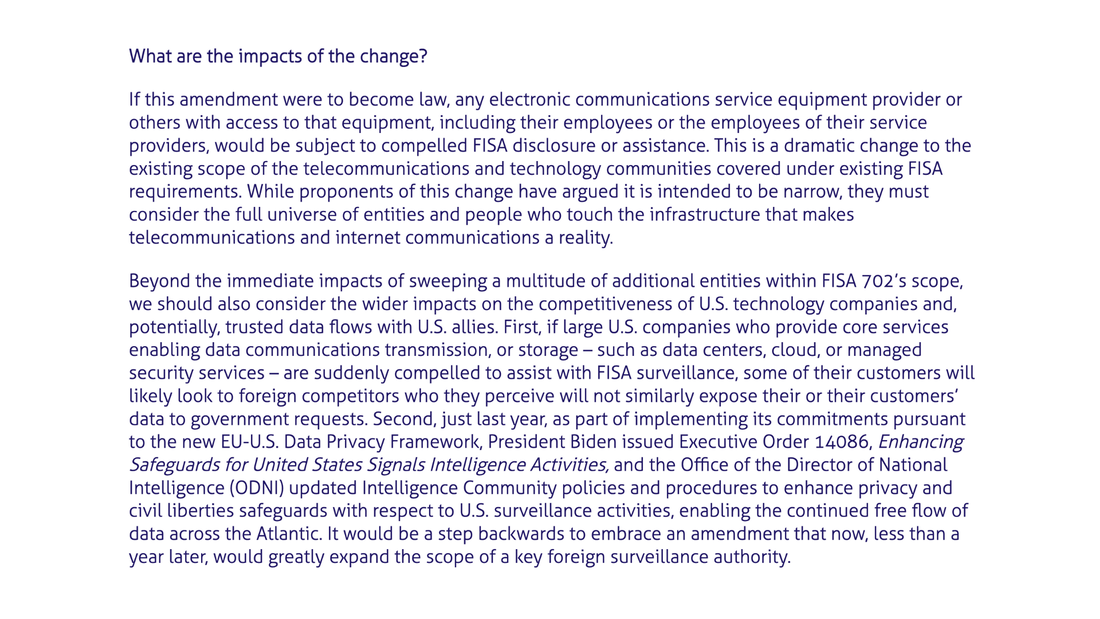
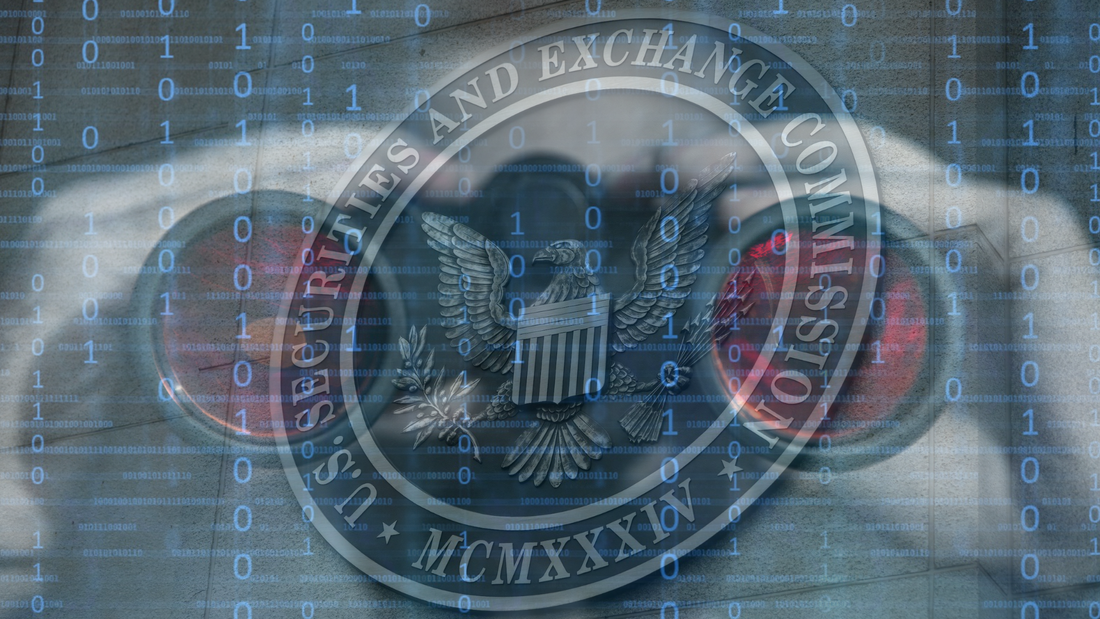
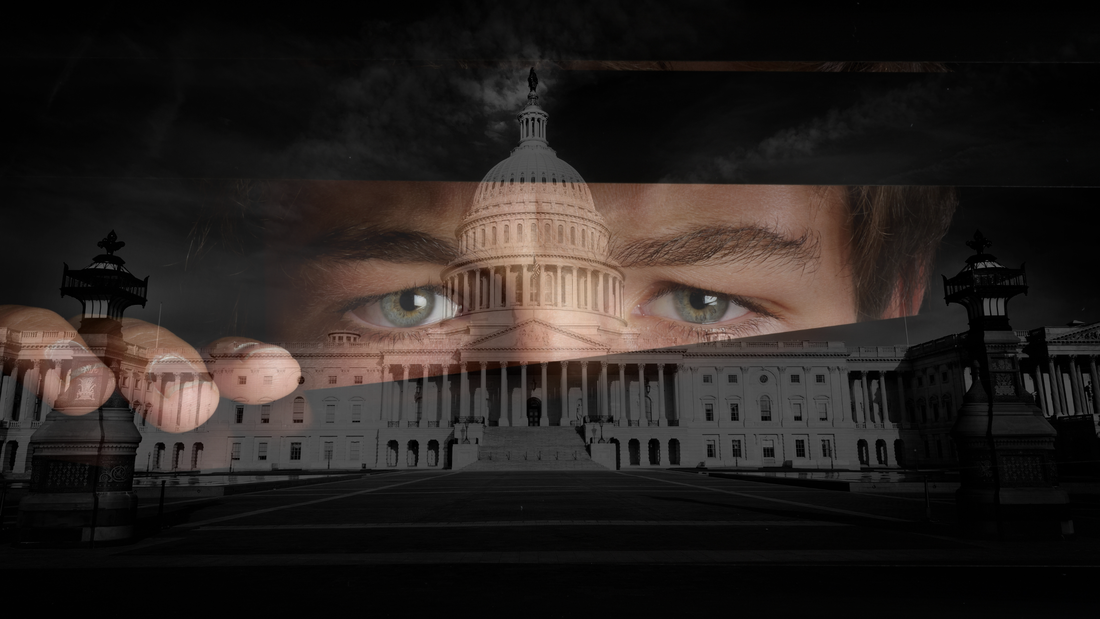
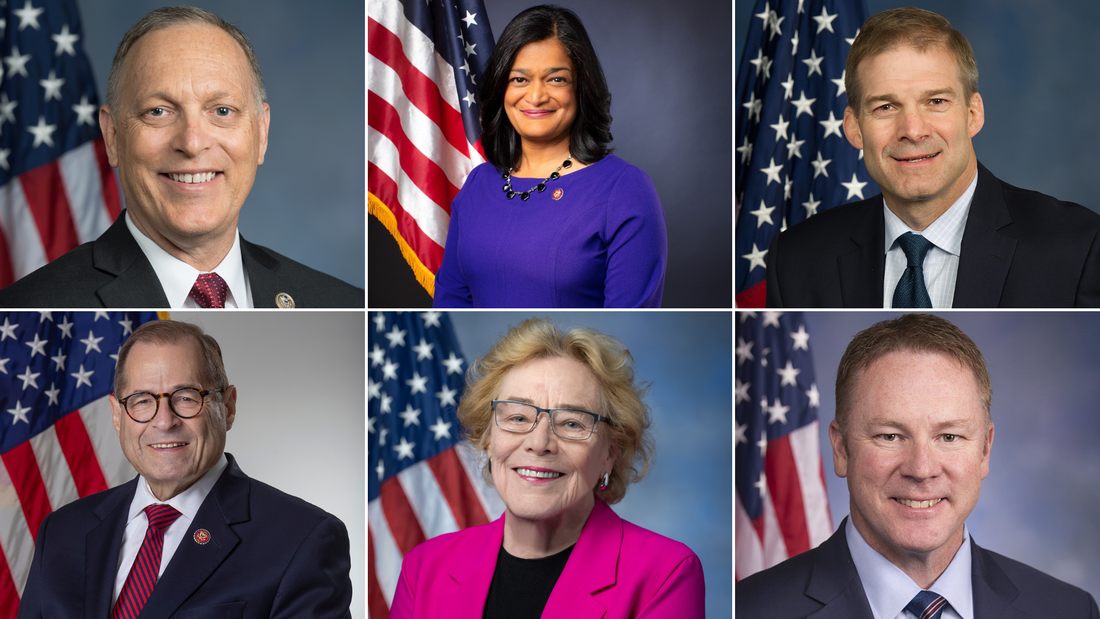
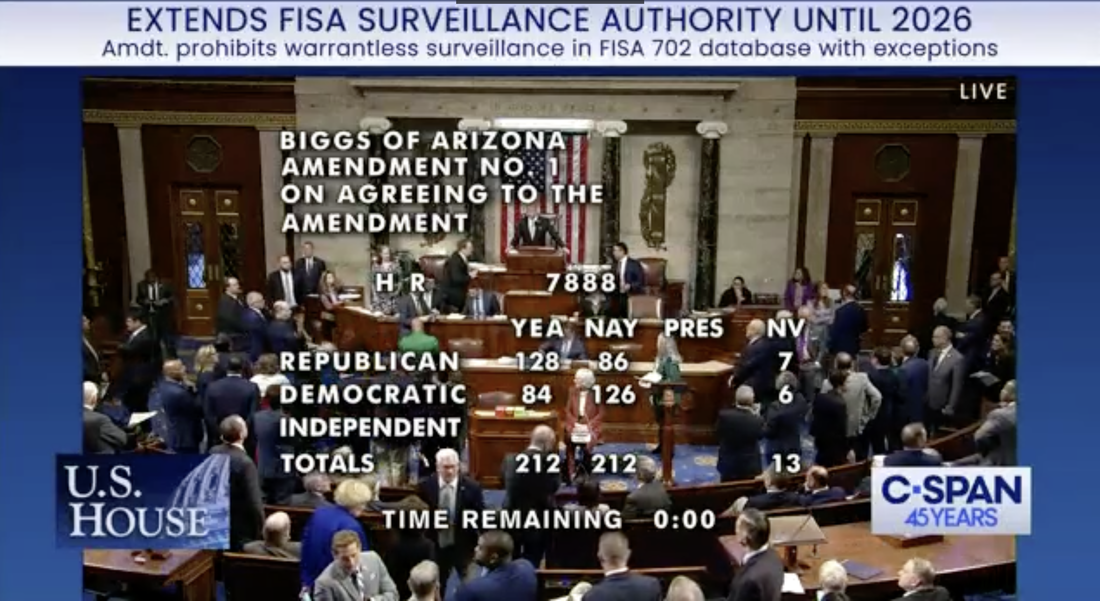
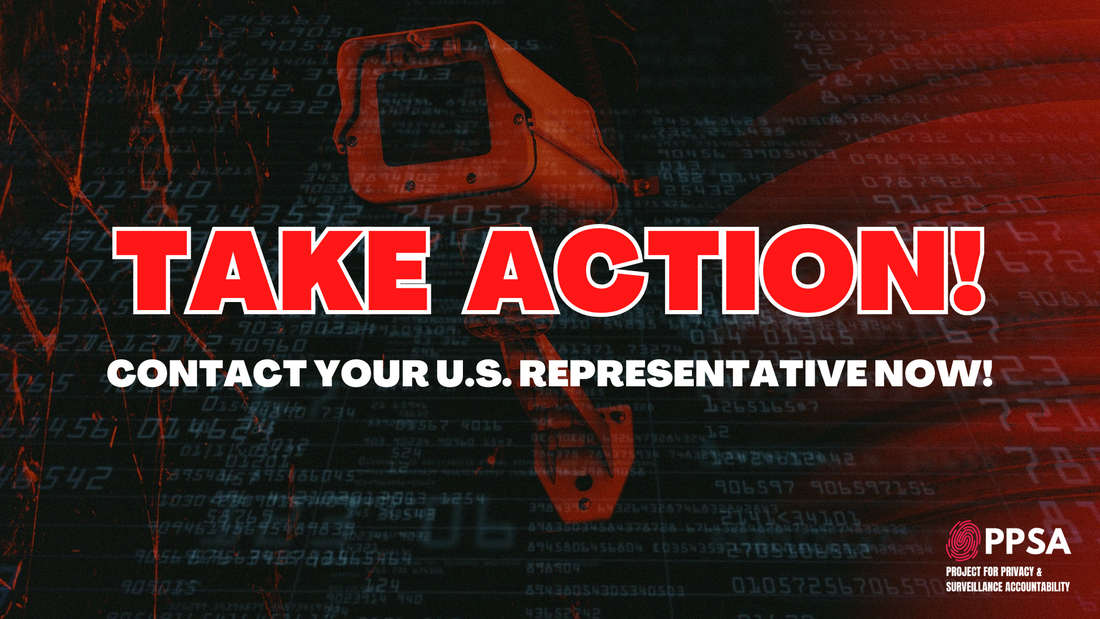
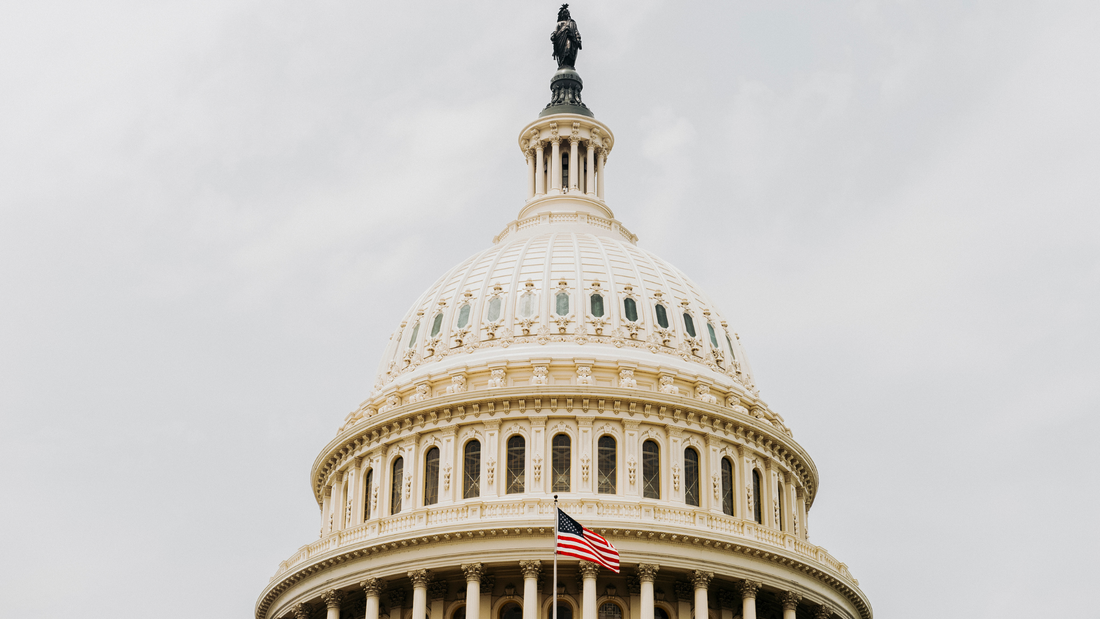
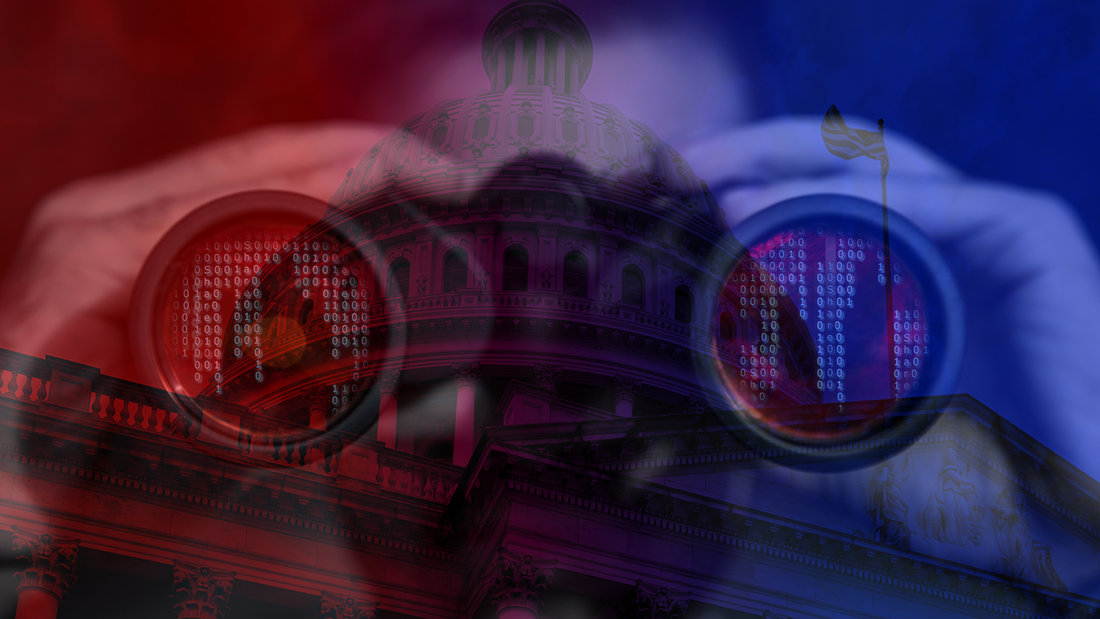
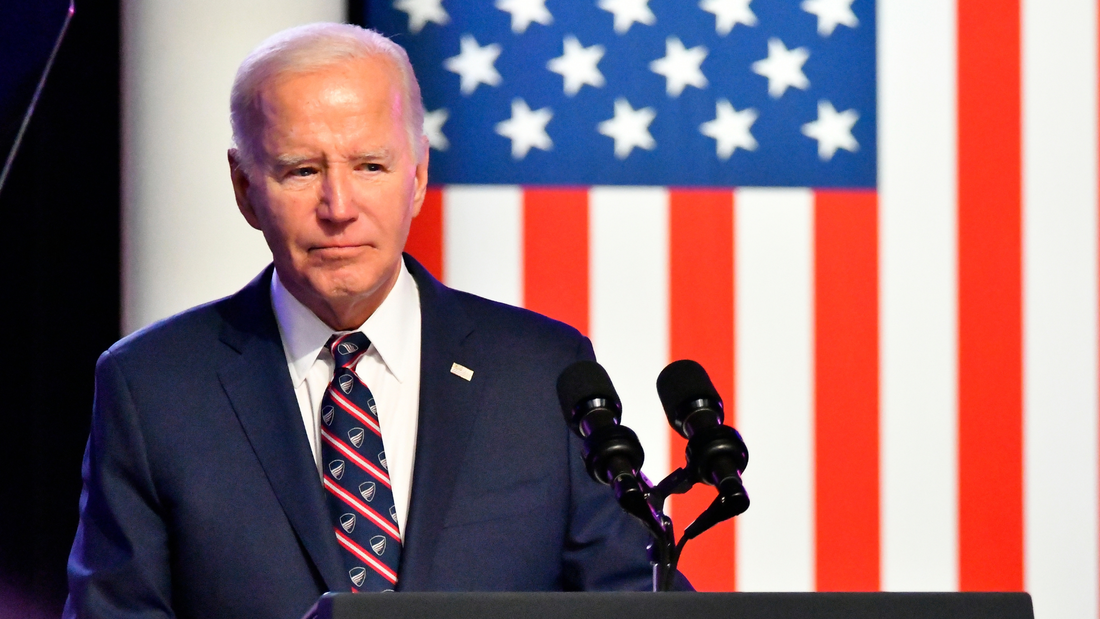
 RSS Feed
RSS Feed